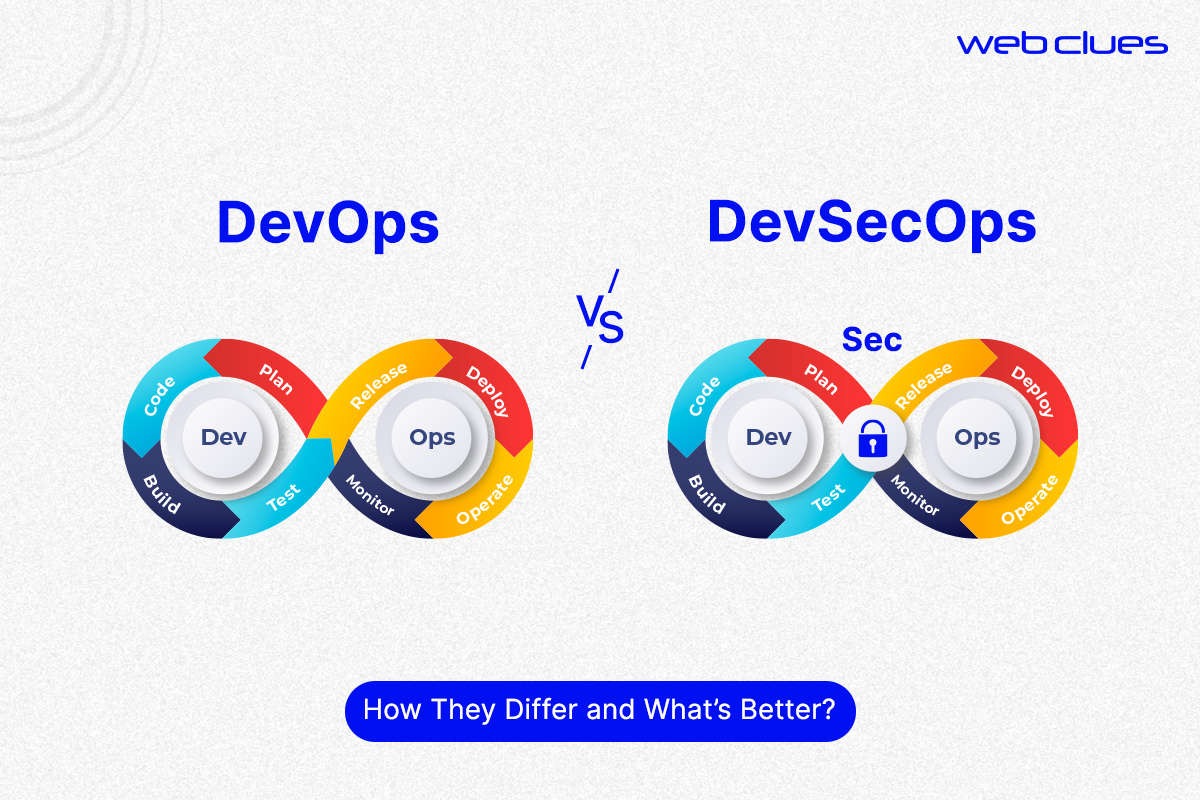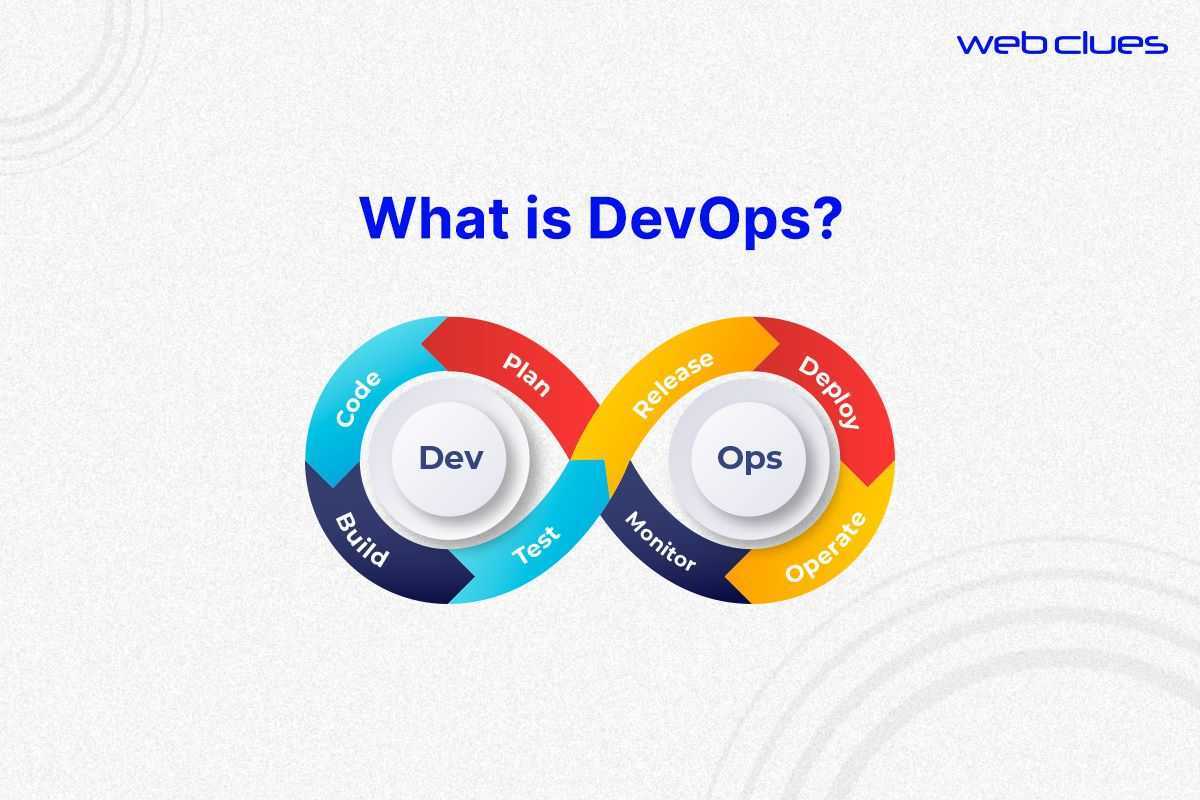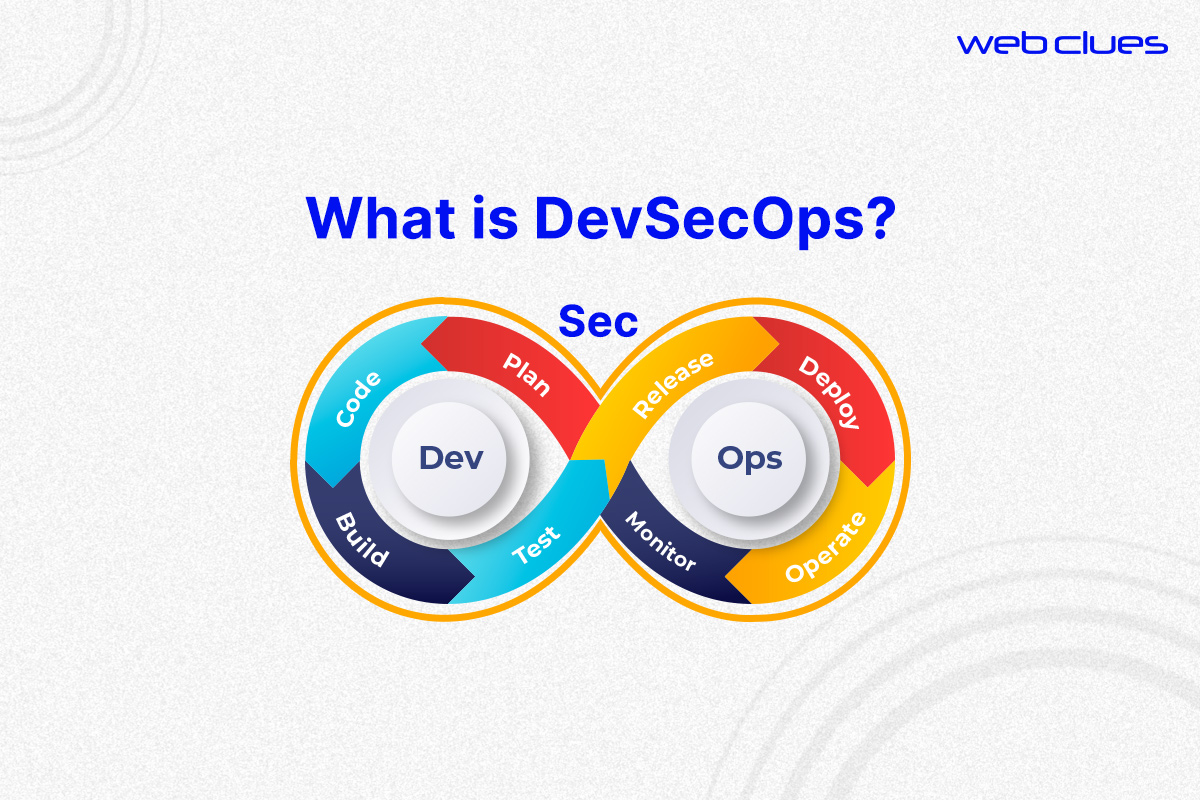DevOps vs DevSecOps – How They Differ and What’s Better?

DevOps and DevSecOps have revolutionized the way software is developed and released, making it faster and more secure than ever before. And with the world becoming increasingly digital, these practices are becoming more and more important. So, if you want to stay ahead of the competition, be sure to implement DevOps and DevSecOps into your development process.
What is DevOps?
DevOps is a software engineering practice that focuses on collaboration and communication between development, operations, and quality assurance teams to help them build, test, and release software more quickly and efficiently.

What is DevSecOps?
DevSecOps is an extension of the DevOps services and solutions focusing on security. It seeks to integrate security practices right from inception, instead of taking security into account later on. This helps ensure that any code written is secure, and any applications released are secure.

Similarities to Look At
DevOps and DevSecOps are both approaches to software development that emphasize collaboration between teams, the use of automation, and continuous delivery.
- Both emphasize collaboration and communication between different teams and departments, including software developers and IT operations professionals as DevOps service providers.
- Both aim to automate tasks and streamline the software development process.
- Both place a strong emphasis on continuous integration and continuous delivery (CI/CD), wherein code is frequently integrated and tested, and software updates are released regularly.
- Both DevOps and DevSecOps experts seek to improve the speed and efficiency of the software development process.
- Both focus on the use of automation and tooling to support the software development process.
The Role of Automation
Automation is a key component as you hire DevOps engineers. Automation helps in streamlining the software development process to improve efficiency by reducing the need for manual tasks. Automation is also used to integrate security testing and analysis into the development process, for identifying and addressing security issues as early as possible.
Automation in DevOps is helpful in
- Automating the build and deployment process to compile code, run tests, and deploy code to production environments resulting in reduced time and errors.
- Automating infrastructure provisioning to create and manage infrastructures, such as servers and networking components, with the necessary infrastructure in place and making it easier to scale infrastructure as needed.
- Automating monitoring and alerting to monitor the performance and availability of applications and infrastructure for sending alerts when issues are detected so that teams respond quickly to problems and minimize downtime.
Automation in DevSecOps helps in
- Automating security testing to run security tests on code and applications, including vulnerability scans and penetration tests.
- Automating security analysis to analyze code and applications for security issues, using techniques such as static analysis and runtime analysis.
- Automating routine security tasks, such as applying security patches and monitoring for security breaches.
The Role of Active Monitoring
Active monitoring is the continuous monitoring of systems, applications, and infrastructure for performance and availability if you ask DevOps engineers. In the context of DevOps, active monitoring is used to ensure systems and applications are functioning properly and meeting the needs of users. In DevSecOps, active monitoring ensures the security and integrity of systems, applications, and infrastructure including monitoring for security breaches, unauthorized access, and other security-related issues.
Active monitoring in DevOps is helpful in
- Performance monitoring to track the performance of systems and applications, including metrics such as response time and resource utilization.
- Availability monitoring to track the availability of systems and applications, including uptime and downtime.
- Alerting to send alerts when issues are detected, such as performance problems or availability issues.
Active monitoring in DevSecOps helps in
- Security monitoring to track the security of systems and applications, including monitoring for security breaches and unauthorized access.
- Compliance monitoring to ensure that systems and applications are compliant with relevant security standards and regulations.
- Alerting to send alerts when security issues are detected, such as security breaches or unauthorized access.
Evolution from DevOps to DevSecOps
DevSecOps evolved from DevOps services and solutions as a response to the growing recognition of security as an important consideration in the software development process. DevOps had focused on increasing the efficiency and speed of the software development process but had not necessarily placed a strong emphasis on security.
DevSecOps was developed by DevOps service providers as a way to integrate security practices into the software development process as soon as it all begins so that security is being taken care of at every stage of the process. This included incorporating security testing and analysis into the development process and automating security tasks.
Activities to expect in both
There are tasks involved in the DevOps approach to software development. The key ones to expect as you hire DevOps engineers include:
- Continuous integration (CI), a practice of frequently integrating code changes into a shared code repository. It identifies and fixes issues early in the development process, and can improve the overall quality of the codebase.
- Continuous delivery (CD), a practice of automating the build, test, and deployment process for software updates. It allows teams to release updates to users more quickly and with fewer errors.
- Infrastructure as code (IaC) wherein coding is used to manage and provision infrastructures, such as servers and networking components. It makes it easier to scale infrastructure as needed and ensure that the necessary resources are in place when they are needed.
- Monitoring and alerting tools to track the performance and availability of systems and applications, and to send alerts when issues are detected. It helps teams respond quickly to problems and minimize downtime.
- Collaboration and communication between different teams and departments, including software developers and IT operations professionals. It ensures that everyone is working towards a common goal and that issues can be identified and addressed quickly.
In DevSecOps, all of the above activities are involved, but there is an additional activity for DevSecOps experts to perform:
Security testing and analysis into the software development process, to identify and address security issues using techniques such as static analysis, dynamic analysis, and penetration testing as you consult DevOps service providers.
Migration from DevOps to DevSecOps
When transitioning from DevOps to DevSecOps, there are several steps DevOps engineers must take. The first is to assess the current security landscape and identify any potential security vulnerabilities. This includes conducting penetration testing, static code analysis, and dynamic code analysis to identify any weak spots. Once identified, DevOps engineers should then define a security strategy and prioritize the security improvements. This includes determining which data needs to be secured, what security tools should be implemented, and how to monitor and alert on security events. DevOps engineers should also develop secure coding best practices and integrate these into their existing processes. Additionally, they should ensure that any new or existing code is tested for security vulnerabilities. Finally, they should develop a disaster recovery plan in case of a security breach or outage. By taking these steps, DevOps engineers will be better equipped to handle the transition from DevOps to DevSecOps.
Is it better to transit from DevOps to DevSecOps?
If you're already familiar with DevOps, then transitioning to DevSecOps might sound like a daunting task. But it's actually a great move for any business looking to stay ahead of the curve and ensure that their systems and applications are secure. DevSecOps combines the principles of DevOps with the security measures of traditional security policies. By doing this, you can create stronger, more secure systems and applications, preventing any potential vulnerabilities or threats from arising. Additionally, DevSecOps allows for faster development cycles, as the security measures are already built into the development process. This means that you don't have to go back and fix any security issues after the fact — they are taken care of from the beginning, saving you time and money. DevSecOps is truly the way of the future and if you want to stay ahead of the game, it's worth considering making the switch.
Build Your Agile Team
Hire Skilled Developer From Us
undefined
undefined
undefinedOur Recent Blogs
Sharing knowledge helps us grow, stay motivated and stay on-track with frontier technological and design concepts. Developers and business innovators, customers and employees - our events are all about you.
Contact Information
Let’s Transform Your Idea into Reality - Get in Touch
India
Ahmedabad
1007-1010, Signature-1,
S.G.Highway, Makarba,
Ahmedabad, Gujarat - 380051
Rajkot
1308 - The Spire, 150 Feet Ring Rd,
Manharpura 1, Madhapar, Rajkot, Gujarat - 360007
UAE
Dubai
Dubai Silicon Oasis, DDP,
Building A1, Dubai, UAE
USA
Delaware
8 The Green, Dover DE, 19901, USA
New Jersey
513 Baldwin Ave, Jersey City,
NJ 07306, USA
California
4701 Patrick Henry Dr. Building
26 Santa Clara, California 95054
Australia
Queensland
120 Highgate Street, Coopers Plains, Brisbane, Queensland 4108
UK
London
85 Great Portland Street, First
Floor, London, W1W 7LT
Canada
Burlington
5096 South Service Rd,
ON Burlington, L7l 4X4





